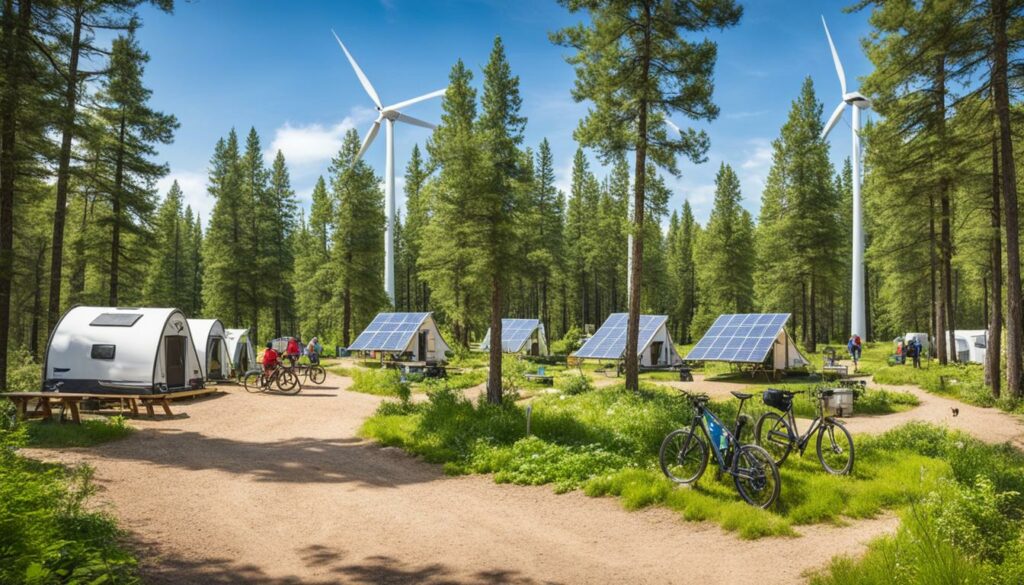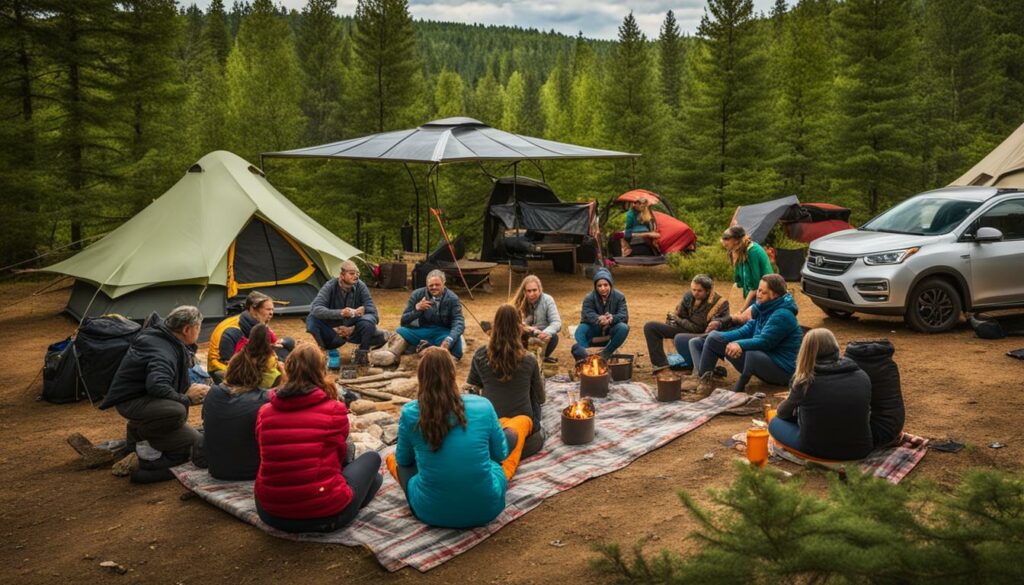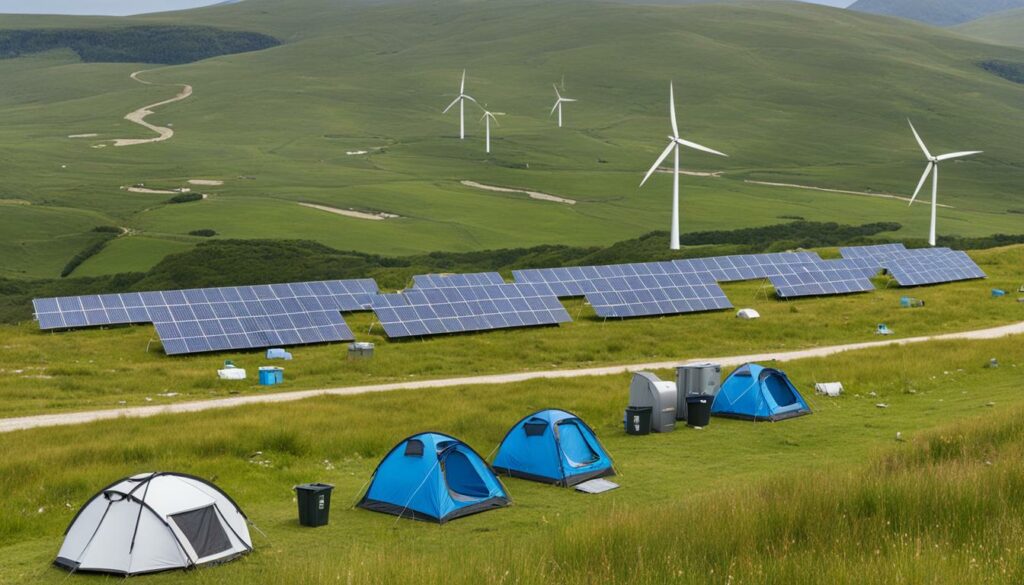As the world becomes more environmentally conscious, sustainable tourism is rapidly gaining momentum. Campgrounds, in particular, are no exception in the tourism industry to follow sustainable and eco-friendly practices. Economic sustainability in campgrounds is crucial for the longevity of the industry. It is imperative to adopt sustainable campground practices that not only benefit the environment but also contribute to the economic sustainability of campgrounds.
In this article, we will delve into the step-by-step approach necessary to achieve economic sustainability in campgrounds. We will cover the various sustainable practices that campgrounds can implement to reduce their environmental footprint while increasing their profitability. By leveraging cost optimization and revenue generation strategies, campgrounds can maintain a sustainable business model while still providing exceptional experiences to their customers.
Key Takeaways:
- Economic sustainability in campgrounds is essential to ensure long-term success.
- Sustainable campground practices benefit not only the environment but also contribute to the economic sustainability of campgrounds.
- Campgrounds should leverage cost optimization and revenue generation strategies to maintain a sustainable business model.
- Balancing consumer demands with environmental sustainability is crucial for sustaining the camping industry.
- Adopting sustainable business practices will allow campgrounds to remain competitive and contribute to the growth of the sustainable tourism industry.
Understanding Economic Sustainability in Campgrounds
As the sustainable camping industry continues to expand, so does the demand for eco-friendly campgrounds. To meet these growing expectations, campgrounds must adopt sustainable business models that prioritize economic sustainability while reducing their environmental impact.
Economic sustainability in campgrounds involves practices that enable business owners to operate in a way that maximizes profits while preserving natural resources and promoting community well-being. By embracing sustainable business models, campgrounds can reduce costs, increase revenue, and attract more visitors seeking eco-friendly vacation options.
The sustainable camping industry is gaining momentum as more and more people become conscious of their impact on the environment. Today’s consumers are environmentally aware and willing to spend more money on eco-friendly vacations. As such, eco-friendly campgrounds that implement sustainable practices have a competitive advantage in the market.
Campgrounds can become eco-friendly in many ways. They can introduce green energy solutions, use eco-friendly cleaning products, source local and organic products, and educate their staff and visitors on sustainable behavior. These actions can significantly reduce their carbon footprint and promote economic sustainability in the long run.
The table below highlights some examples of eco-friendly practices that can be implemented in campgrounds:
Eco-friendly Practices in Campgrounds
| Practice | Description |
|---|---|
| Alternative energy sources | Installing solar panels, wind turbines, or geothermal systems to reduce the reliance on non-renewable energy sources. |
| Green waste management | Implementing recycling, composting, and waste reduction programs to minimize the amount of waste that ends up in landfills. |
| Water conservation | Using water-saving technologies, such as low-flow showerheads and toilets, and planting water-efficient vegetation. |
| Community engagement | Partnering with local businesses, organizations, and government entities to create synergies and support sustainable initiatives that drive revenue and benefit the community. |
| Staff education | Providing training and education to staff on sustainable practices, including resource conservation, waste management, and recycling. |
Eco-friendly campgrounds are not only beneficial for the environment but also for the bottom line. By embracing economic sustainability and implementing sustainable practices, campgrounds can create a sustainable business that benefits both the environment and the economy.
Implementing Sustainable Practices in Campgrounds

Implementing sustainable campground practices is essential for reducing environmental impact and increasing revenue. By adopting green campground practices such as waste management, energy conservation and water efficiency, campgrounds can minimize operational costs while also appealing to eco-conscious tourists.
Waste management is crucial for minimizing the environmental footprint of campgrounds. Properly disposing of waste, recycling, and implementing composting programs can significantly reduce the amount of waste that ends up in landfills. Energy conservation is another key aspect of sustainable campground practices. Switching to energy-efficient lighting, regulating temperature controls, and using renewable energy sources such as solar power are all effective ways to reduce energy consumption and costs.
Water efficiency is also important in sustainable campground practices. Implementing low-flow showerheads and toilets, fixing leaks, and using water-saving techniques such as xeriscaping can all help reduce water consumption. In addition to benefiting the environment, these initiatives can also attract eco-conscious tourists who actively seek out environmentally-friendly accommodations.
Sustainable Initiatives in Popular Campgrounds
| Campground | Sustainable Initiatives |
|---|---|
| Yosemite National Park, CA | Eliminating single-use plastics, promoting water conservation, providing recycling and compost bins throughout the park |
| Kaibab National Forest, AZ | Encouraging low-impact camping practices, using renewable energy, offering educational programs on environmental conservation |
| Glacier National Park, MT | Implementing a green waste program, reducing energy consumption through sustainable building practices, promoting responsible wildlife viewing and outdoor recreation |
By implementing sustainable campground practices, campgrounds can not only reduce their environmental impact but also increase revenue and attract eco-conscious tourists. Initiatives such as waste management, energy conservation and water efficiency are just a few examples of the sustainable practices that can benefit both the environment and the bottom line.
Revenue Optimization in Campgrounds
Generating revenue is essential for the economic sustainability of campgrounds. Revenue optimization strategies help maximize profits while delivering unique experiences to visitors. A well-planned and coordinated approach to revenue generation can lead to increased visibility, higher customer engagement, and long-term growth.
Diversifying Revenue Streams
Campgrounds can diversify revenue streams by offering a range of services and amenities beyond traditional camping. This includes activities such as hiking, fishing, or kayaking, as well as accommodation options such as RVs, cabins, or glamping tents.
“By diversifying their revenue streams, campgrounds can attract a wider customer base and generate consistent revenue throughout the year.”
The incorporation of event spaces and facilities such as conference rooms, party areas, or wedding venues can generate additional revenue streams while leveraging unused spaces within the campground. Unique offerings such as farm-to-table dining experiences and specialized tours can further diversify revenue streams and attract customers seeking unique experiences.
Offering Unique Experiences
Offering unique experiences can help differentiate a campground from competitors and attract more visitors. This can include personalized experiences such as guided tours by experienced in outdoor activities or unique packages that bundle camping with other amenities or activities.
Creating targeted packages for specific demographics, such as families or corporate retreats, can also help increase revenue while offering customized and memorable experiences for customers.
Leveraging Technology
The use of technology can help increase revenue for campgrounds. Online booking systems, mobile apps, and digital marketing tools can optimize and streamline the customer experience, enabling campgrounds to attract more customers and generate more revenue.
Implementing technology-driven revenue optimization strategies, such as dynamic pricing, yield management, and data analytics, can enable a campground to maximize occupancy and revenue per site.
Cost Optimization in Campgrounds

Campgrounds can operate more sustainably while minimizing costs through cost optimization techniques. This approach involves identifying areas where expenses can be reduced without compromising the quality of the services and experiences provided to campers.
Operational efficiency
One way to optimize costs in campgrounds is to improve operational efficiency. By streamlining processes and reducing waste, campgrounds can save time and money. This can include optimizing staff schedules, managing inventory and supplies, and automating routine tasks.
| Operational efficiency strategies | Cost savings |
|---|---|
| Implementing a reservation system | $500-$1000 per year on staff time |
| Reducing electricity use | $200-$400 per month on energy bills |
| Automating check-in procedures | $300-$500 per month on staff time |
Resource management
Campgrounds can also optimize costs by managing resources more effectively. This includes reducing water and energy consumption, utilizing natural light, and composting organic waste. By implementing these practices, campgrounds can reduce their environmental impact and operating costs.
“Resource management is not only about being environmentally responsible but also about saving costs, in particular energy and water use. It’s a win-win situation for campgrounds.”
Reducing overhead expenses
Campgrounds can reduce overhead expenses by exploring alternative options such as outsourcing, negotiating contracts, and reducing marketing expenses. By evaluating expenses and looking for creative solutions, campgrounds can reduce unnecessary costs and maximize revenue.
Marketing Sustainable Campgrounds
Effective marketing is crucial to attract visitors and generate revenue in sustainable campgrounds. To promote sustainable tourism, campgrounds should focus on reaching their target audience and showcasing their eco-friendly features and benefits.
One effective strategy is to partner with local businesses that share their sustainability values. This can include restaurants that use locally sourced and organic ingredients or activity providers that offer nature-based experiences. Collaborating with these partners can help sustainable campgrounds increase their visibility and broaden their customer base.
Another approach is to use digital marketing tools to target specific audiences. Social media platforms such as Facebook and Instagram allow campgrounds to reach potential customers directly and communicate their sustainable practices and unique offerings.
Providing educational materials and highlighting the environmental impact of the campground’s sustainable practices can also appeal to environmentally conscious travelers. This can include information on energy-efficient infrastructure, waste reduction initiatives, and wildlife conservation efforts.
“Sustainability is the key to the future of tourism, and camping can be an excellent way to promote it. Travelers want to make a positive impact on the environment and are willing to support businesses that share their values.”
Collaborations for Sustainability

Collaborative efforts are powerful drivers of economic sustainability in campgrounds. By partnering with local businesses, organizations, and government entities, campground owners can create synergies and support sustainable initiatives that drive revenue and benefit the community.
One example of successful collaboration is the partnership between Apple Valley Campground and the National Park Service. By teaming up, they were able to implement sustainable business models and eco-friendly practices that boosted campground revenue while preserving the natural beauty of the area.
Another way to collaborate for sustainability is by sharing resources and knowledge with other campgrounds in the area. This can lead to cost-saving opportunities and foster a sense of community among campground owners.
The Benefits of Collaborations for Sustainable Business Models
| Benefits | Collaborative Efforts | Individual Efforts |
|---|---|---|
| Cost Savings | X | |
| Increased Revenue | X | |
| Community Support | X | |
| Sustainable Impact | X |
Table: Comparison of the benefits of collaborative and individual efforts for sustainable business models in campgrounds.
As seen in the table above, collaborative efforts offer multiple benefits such as cost savings, increased revenue, community support, and sustainable impact, making it an essential part of achieving economic sustainability in campgrounds.
Long-Term Planning and Adaptation
Long-term planning and adaptation are crucial for achieving economic sustainability in campgrounds. Continuous assessment, innovation, and flexibility are essential to meet changing market demands and ensure long-term success.
One of the most important factors in long-term planning is the development of sustainable business models. By implementing sustainable practices in all aspects of the business, from operations to marketing, campgrounds can maximize profits while minimizing negative impact on the environment and the community.
Adapting to changing market demands and trends is also critical for economic sustainability. Campground owners and managers need to stay up-to-date on the latest sustainable camping industry best practices and technologies, and be prepared to make changes to their business model in response to changing consumer preferences and environmental factors.
To ensure that they are staying on track with sustainability goals, it is important for campgrounds to track and measure their environmental impact, revenue, and customer satisfaction. Assessing the effectiveness of sustainability initiatives allows campground management to recognize successes and identify areas for improvement.
“Long-term success in the campground industry demands both vision and adaptation, a willingness to change with the times and embrace new ways of doing business while staying steadfastly committed to sustainable practices.”
Training and Education for Sustainability
Equipping staff and stakeholders with the knowledge and skills needed to implement sustainable campground practices is crucial for achieving economic sustainability in this industry. Investing in employee training and education not only benefits the environment but also contributes to the growth of the sustainable camping industry.
Training and education help employees understand the importance of sustainable practices such as waste management, energy conservation, and water efficiency. By promoting sustainable behaviors and responsible consumption, employees can reduce the campground’s impact on the environment while also creating a positive experience for visitors.
Moreover, educating stakeholders such as suppliers, partners, and local authorities can encourage collaboration towards sustainable initiatives. By fostering a culture of sustainability, campgrounds can attract and retain customers who value eco-friendliness and social responsibility.
Educational Programs and Certifications
Several educational programs and certifications exist within the camping industry to promote sustainable practices. The Green Certification Program by the National Association of RV Parks and Campgrounds (ARVC) recognizes campgrounds that meet specific criteria related to energy efficiency, waste reduction, and environmental management.
The Leave No Trace Center for Outdoor Ethics offers training and certification programs to promote responsible outdoor recreation. The program emphasizes seven core principles that encourage sustainable behavior among campers and visitors, including respect for wildlife, minimizing fire impact, and packing out trash. Campgrounds that adopt these principles can attract visitors who value sustainable tourism and minimize their impact on the environment.
Overall, investing in training and education for sustainability benefits not only the environment but also the campground’s long-term economic sustainability. By developing a culture of sustainability, campgrounds can attract eco-conscious customers, increase revenue, and contribute to the growth of the sustainable camping industry.
Measuring and Reporting on Sustainable Impact
Measuring and reporting on sustainable impact is critical for achieving economic sustainability in campgrounds. By tracking key performance indicators and conducting audits, campground owners and operators can identify areas where sustainable business models can be implemented to drive economic sustainability in campgrounds. Additionally, effectively communicating the campground’s sustainability efforts to stakeholders and customers can be an essential factor in their decision-making process.
To measure and report on sustainable impact, campground owners and operators should consider conducting annual audits that evaluate the environmental, social, and economic performance of the campground. These audits should track metrics such as energy and water consumption, waste reduction, and revenue generated from sustainable practices. Furthermore, campground owners should use these audits to identify areas where sustainability efforts can be improved.
Effective communication of the campground’s sustainability efforts is also essential. Campground owners and operators should create reports that outline their sustainability performance and communicate the report’s findings to stakeholders and customers. These reports can be used to showcase the campground’s commitment to economic sustainability, increase customer loyalty, and attract new visitors who value sustainable practices.
Example Sustainability Report
| Category | Metric | Baseline | Current |
|---|---|---|---|
| Energy | Kilowatt Hours (kWh) | 20,000 kWh | 15,000 kWh |
| Water | Gallons | 2,000 gal | 1,500 gal |
| Waste Reduction | Pounds of landfill waste | 5,000 lbs | 3,000 lbs |
| Sustainable Revenue | Percentage of revenue from sustainable practices | 10% | 15% |
This report shows the progress made in the campground’s sustainability efforts, highlighting reduced energy and water usage, decreased landfill waste, and increased revenue from sustainable practices. By tracking and reporting on sustainable impact, campground owners and operators can demonstrate their commitment to economic sustainability in campgrounds and differentiate their campground from competitors.
Innovation and Technologies for Economic Sustainability

Technology has the potential to revolutionize sustainable campground practices while also contributing to profit maximization in campgrounds. With advancements in renewable energy systems, smart infrastructure, and digital marketing tools, campground owners can improve their bottom line while reducing their ecological footprint.
Renewable energy systems such as solar panels and wind turbines can help campgrounds produce their own energy, reducing their reliance on non-renewable sources. This not only contributes to a campground’s sustainability but also helps to reduce energy costs.
Smart infrastructure is another area where technology can make a significant impact. The incorporation of automated systems for water management, waste management, and lighting can help to improve efficiency while reducing costs. Campgrounds can also use digital tools to optimize their operations, such as booking and reservation management systems that allow for real-time monitoring and analytics.
| Examples of Technologies for Economic Sustainability | Benefits |
|---|---|
| Solar panels and wind turbines | Reduction in energy costs and carbon footprint |
| Automated systems for water management, waste management, and lighting | Improved efficiency and reduced costs |
| Booking and reservation management systems | Real-time monitoring and analytics for optimization |
Finally, campground owners can use digital marketing tools to promote their sustainability efforts and attract visitors who align with their values. Social media platforms such as Facebook and Instagram can be effective tools for reaching new audiences and showcasing a campground’s eco-friendly features.
By incorporating innovative technologies into their operations, campground owners can achieve economic sustainability in a way that benefits both the bottom line and the environment.
Conclusion
In conclusion, achieving economic sustainability in campgrounds is crucial for long-term success in the industry. By adopting sustainable business models, implementing revenue generation and cost optimization strategies, collaborating with local entities, and leveraging technologies and innovations, campgrounds can operate more sustainably while maximizing profits.
Moreover, emphasizing the importance of sustainable practices and offering unique experiences can help attract more visitors and promote sustainable tourism. It is also important to provide staff and stakeholders with the necessary training and education, continuously assess and adapt to market demands, and measure and report on the sustainable impact of the campground.
Overall, economic sustainability in campgrounds is not only a responsibility towards the environment, but also towards the economic well-being of the campground and the entire tourism industry. By following the step-by-step approach outlined in this article, campgrounds can contribute to a more sustainable future while reaping the benefits of a thriving business.
Economic Sustainability in Campgrounds, sustainable business models, and campground revenue generation are not only crucial for the industry, but for the environment and the economic well-being of the campground. By following the step-by-step approach outlined in this article, campgrounds can contribute to a more sustainable future while reaping the benefits of a thriving business.
FAQ
What is economic sustainability in campgrounds?
Economic sustainability in campgrounds refers to the ability of a campground to generate sufficient revenue and profits while minimizing costs and maintaining long-term viability. It involves implementing sustainable business models and practices that prioritize environmental conservation, social responsibility, and financial stability.
Why are sustainable business models important for campgrounds?
Sustainable business models are important for campgrounds as they help maximize profits while minimizing negative environmental and social impacts. These models focus on revenue generation strategies that align with the principles of economic sustainability, such as offering eco-friendly amenities, promoting sustainable tourism, and integrating innovative technologies.
What are some eco-friendly practices that can be implemented in campgrounds?
There are several eco-friendly practices that can be implemented in campgrounds, including waste management and recycling programs, energy-efficient infrastructure and appliances, water conservation measures, and the use of renewable energy sources. These practices not only reduce the campground’s environmental footprint but also contribute to cost savings and improved customer satisfaction.
How can campgrounds optimize revenue generation?
Campgrounds can optimize revenue generation by diversifying their revenue streams, offering unique experiences and amenities, and leveraging technology to attract more visitors. This can include partnering with local businesses, organizing events and activities, providing premium services, and implementing online reservation systems to streamline the booking process and increase occupancy rates.
What are some cost optimization techniques for campgrounds?
Cost optimization techniques for campgrounds include improving operational efficiency, optimizing resource management, and reducing overhead expenses. This can be achieved through effective staff scheduling, implementing energy-saving measures, adopting sustainable purchasing practices, and conducting regular maintenance to prolong the lifespan of facilities and equipment.
How can sustainable campgrounds be effectively marketed?
Sustainable campgrounds can be effectively marketed by emphasizing their eco-friendly features and benefits, targeting audiences interested in sustainable tourism, and utilizing digital marketing channels. Engaging in storytelling and showcasing the campground’s commitment to sustainability through content marketing, social media campaigns, and partnerships with eco-conscious influencers can help attract and retain customers.
How can collaborations enhance sustainability in campgrounds?
Collaborations with local businesses, organizations, and government entities can enhance sustainability in campgrounds by fostering knowledge sharing, pooling resources, and creating synergies. Collaborative initiatives can include joint marketing campaigns, sharing best practices, and implementing community-based sustainable tourism projects, ultimately driving revenue generation and benefiting the local community.
Why is long-term planning and adaptation important for economic sustainability in campgrounds?
Long-term planning and adaptation are important for economic sustainability in campgrounds because they enable the campground to stay ahead of market trends, meet changing customer demands, and identify opportunities for growth. By continuously assessing the market, innovating offerings, and adapting business strategies, campgrounds can ensure their long-term success and maintain economic sustainability.
How does training and education contribute to economic sustainability in campgrounds?
Training and education contribute to economic sustainability in campgrounds by equipping staff and stakeholders with the knowledge and skills needed to implement sustainable campground practices. This includes training on waste management, environmental conservation, customer service, and sustainable business operations. Well-trained staff can enhance the overall guest experience, improve efficiency, and support the campground’s sustainable goals.
Why is it important to measure and report on the sustainable impact of campgrounds?
Measuring and reporting on the sustainable impact of campgrounds is important because it allows the campground to track progress, identify areas for improvement, and communicate their sustainability efforts to stakeholders and customers. Key performance indicators such as energy and water consumption, waste diversion rates, and guest satisfaction surveys can provide valuable insights and support decision-making for continuous improvement.
How can innovation and technologies contribute to economic sustainability in campgrounds?
Innovation and technologies can contribute to economic sustainability in campgrounds by enabling the adoption of sustainable campground practices and maximizing revenue generation. This can include the use of renewable energy systems, smart infrastructure, digital marketing tools, and online booking platforms. These advancements not only reduce environmental impacts but also improve operational efficiency, attract tech-savvy guests, and enhance the overall guest experience.
What is the significance of economic sustainability in campgrounds?
Economic sustainability in campgrounds is significant as it ensures the long-term viability and profitability of the campground while minimizing negative environmental and social impacts. By adopting sustainable business models, implementing eco-friendly practices, and optimizing revenue and cost management, campgrounds can contribute to the overall sustainability of the tourism industry and create a positive impact on the local economy and community.





